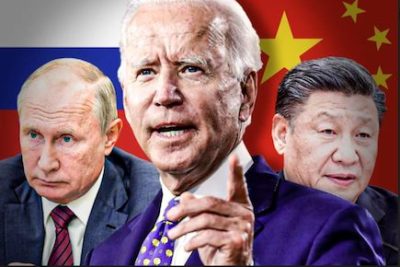Biden Intensifies Anti-China/Russia Rhetoric as US Struggles with Rising Inflation

All Global Research articles can be read in 51 languages by activating the “Translate Website” drop down menu on the top banner of our home page (Desktop version).
To receive Global Research’s Daily Newsletter (selected articles), click here.
Visit and follow us on Instagram at @globalresearch_crg.
***
While many in the US are trying to address pressing domestic issues, the White House’s political rhetoric is intended to divert voters’ attention to non-existent external threats. If one is to believe Western mass media, it would appear that the US is being encircled by external threats, primarily China and Russia, but also by the likes of Iran and North Korea.
Although China has become the main focus of American media in recent years, especially regarding Taiwan, Xinjiang and Hong Kong, Russia is of course not immune from such propaganda campaigns. The media continues to publish reports on China’s supposed unfair trade practices and imbalances, the threat of stealing advanced American technology, and domestic human rights issues, whilst with Russia it makes similar criticisms on domestic human rights issues, supposed election interference and the country’s policy on Ukraine.
Anti-China rhetoric began under former President Donald Trump, but has certainly not slowed down under his successor Joe Biden. The anti-Russia rhetoric has continued relentlessly since the Cold War.
In the case of China, the FBI said that every 10 hours, it opens a new investigation relating to acts of espionage and theft of intellectual property, as well as other threats to US national security. However, most of the investigations collapse before going to trial, as happened to Professor Gang Chen of the prestigious Massachusetts Institute of Technology, who was accused of hiding ties with the Chinese government.
At the same time, the Biden administration has not taken any practical steps regarding China’s alleged non-compliance with the terms of the Phase 1 trade deal, which has expired. In other words, the US in fact has no evidence to denounce China.
None-the-less, Western media still create a tense atmosphere, intensifying rhetoric about the threat from Russia and China. Their goal on the domestic front is to make the American people feel that they are under threat from foreign countries but that authorities are doing their best to counter this.
However, if attempting to shift focus to pressing domestic issues, one could be berated by the president himself, as happened to Fox News journalist Peter Doocy, who only asked Biden if inflation was a political responsibility in the context of the upcoming mid-term election. After hearing the question, Biden said in an outburst, “It’s a great asset—more inflation. What a stupid son of a bitch.” He then called Doocy a “stupid bastard.” On the same day, the American president called the reporter to apologise for his comments.
This situation shows how sensitive the topic of inflation is for the Biden administration. Evidently, frustrations are revealing themselves as the upcoming mid-term election does not bode well for the Democrats. According to the latest polls, the Democrats are expected to lose control of Congress. If this occurs, all the blame will fall on Biden.
Many people forget that despite being the world’s largest economy, the US funds its operations with debt. Last year, American public debt was greater than its GDP for the first time since 1946.
Large-scale programs aimed at stimulating the economy by helping individuals and businesses are funded by issuing new dollars. In 2020, the US printed more money to flood the market. According to the fundamentals of economic theory, pumping large amounts of money into the market leads to a sharp increase in inflation. For a while, American authorities have been trying to curb the rise in consumer good prices, and the stock market has held back the rise in inflation.
Although household incomes have risen fairly rapidly because of unprecedented measures (worth more than $1 trillion) by US authorities to help people and businesses survive the recession caused by the COVID-19 pandemic, inflation is even stronger. As a result, compared to 2020 levels, household income has fallen by 1.2% in the US. Due to this significant economic issue, the Biden administration is trying to divert people’s attention from it by ramping up anti-China and anti-Russia rhetoric.
Mid-term elections are held every four years and, in this cycle, politicians are preoccupied with their own ambitions and interests. For this reason, the president’s proposed measures have been met with serious opposition from the Republican Party. Biden’s power is severely limited and the problems associated with the pandemic have not been solved. Stuck in this quagmire, Biden believes all he can do to politically survive is step up anti-China and-Russia rhetoric to gain some rapid, short-term impact in the run-up to the midterm elections.
Despite Biden’s tough attitude towards China and Russia, it does not solve the fundamental problems of the US economy, but rather only exacerbate them.
Tariffs on Chinese products, as an example, have not yet been lifted, which has only intensified the problem of inflation. The US cannot refuse to import Chinese goods because up to 50% of China’s exports are intermediate goods, which are then used by American manufacturers. With global supply chain disruptions because of the pandemic, demand for Chinese goods has increased.
In this way, one (of many) motivating factors for Biden’s continued hostility and provocations against the two Eurasian powers is because of the domestic economic situation. However, whether the same continued threats will be enough to help the Democrats retain power in Congress remains to be seen.
*
Note to readers: Please click the share buttons above or below. Follow us on Instagram, @globalresearch_crg. Forward this article to your email lists. Crosspost on your blog site, internet forums. etc.
Paul Antonopoulos is an independent geopolitical analyst.
Featured image is from btlonline.org

